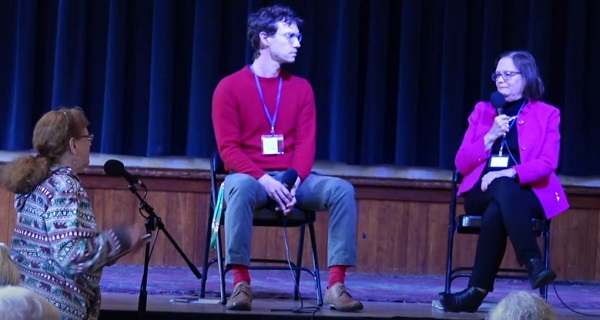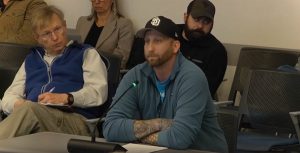Mayor Vinis confirms big cuts without fire fee
8 min read
Presenter: Eugene Mayor Lucy Vinis confirmed Friday that the council is down to just two choices: either pass a $10 million fee or cut millions from the budget. The mayor also disclaimed responsibility for a closure at CAHOOTS, has no answer for growing numbers of hungry people on the streets, and takes a shot at local media on her way out. At City Club Dec. 6, Lucy Vinis.
Lucy Vinis (Eugene mayor): And I will say if the fire service fee does not go forward then every department will be making cuts and that will include the Police Department, so it will undermine that progress again.
[00:00:35] But if the fire service fee goes forward and we’re able to create that separate revenue stream then then I think the progress that we’ve made in terms of funding our public safety system will be able to continue.
[00:00:46] Presenter: She shared background on the proposed fee, which would appear on your EWEB bill.
[00:00:51] Lucy Vinis (Eugene mayor): We’re looking at an $8 million shortfall in our general fund money. And so the city manager convened a revenue advisory committee that met for several months last spring. And this was one of the options they explored and the city manager has developed that with the staff.
[00:01:08] So the proposal is a new revenue stream, a fee for fire services that would be based on the square footage of a piece of property.
[00:01:17] If implemented as proposed, it would be part of your EWEB bill, like the stormwater fee. It’s a range, it’s scaled by the size of the building. So the smallest is 750 square feet or smaller. It’s a $3 a month fee. The average homeowner size, about 1,800 or 2,000 square feet, it’s about $10 a month.
[00:01:37] So it’s a broad fee, but it is across the board and that fee would raise $10 million. Eight million of that would cover existing fire department programs, and it adds a little extra $2 million for some growth in fire services.
[00:01:56] By creating a separate revenue stream to pay for those fire services, you hold the general fund harmless for that other $8 million, and that fills that $8 million hole because you’re not spending it on the fire department. They have an independent source of funding and that million there is then available to help fill the hole in our expenses.
[00:02:17] Presenter: To provide additional context, public comments in response to that fee have called the city’s approach, ‘not quite honest.’ Moving to questions about White Bird and the former Breakfast Brigade, City Club member Mary Leighton.
[00:02:32] Mary Leighton (City Club member): I’m going to ask for solutions and strategies for two problems. One is White Bird. I mean, everybody in my ‘Feeding the Hungry’ community is freaking out that White Bird is closing on 12th Street. And I do not assume anybody’s doing anything terrible, I assume they’re responding to real financial crises. So my question is, where do we properly direct the pressure to solve this problem short of closing a vital resource?
[00:03:01] Presenter: Eugene Mayor Lucy Vinis.
[00:03:02] Lucy Vinis (Eugene mayor): Yeah, that is a particularly thorny question. (I bet it is.) I mean, you know, White Bird is a freestanding nonprofit. (Yeah.) And so they are responsible, their board is responsible for their own finances, they have a contract with the city of Eugene to provide specific services through CAHOOTS and they have an agreement with the county as well on collaborating with the county on the mobile crisis response.
[00:03:26] So those are sort of operational agreements. We’re not a funding agency. (I know, I know this, laughs), So there are critical nonprofits that face a financial crisis, it’s not the city, it does not have the capacity to help them resolve that.
[00:03:43] And I think they are I suppose in some ways a victim of their own success, right? They’re such a tremendous program, CAHOOTS has been such a tremendous program, it went national in 2020 and 2021, everybody wanted to replicate the same program and, you know, and at the same time, the demands are huge and the demands in this city are huge, and for that kind of—
[00:04:05] Mary Leighton (City Club member): That wasn’t my question. I think of you as having the drone’s-eye view of the whole situation. So I know that you guys, I just heard you say you didn’t have any extra money. I’m just saying, who could we write to or talk to who could come on board and help with the problem, assuming everybody would if they could. But where’s the right place to—
[00:04:25] Lucy Vinis (Eugene mayor): Well, I mean, I suppose the first thing is to start with White Bird themselves. What do they want and need? And where do they feel that they need some advocacy? And I don’t have the answer from White Bird where they feel, what is their long-term strategy as they make cuts now? What is their vision for how they will grow and adjust? But I agree that it is a frightening prospect of White Bird having to reduce services because they’re treating a population that is very hard for us to serve.
[00:04:55] Presenter: For additional context, Oregon Democrats approved federal funds for a CAHOOTS-like program, but CAHOOTS itself was not eligible for that funding. Now that Lane County has its own mobile crisis unit, some don’t see CAHOOTS as a victim of its own success, but as a victim of Oregon Democrats. Public safety officials were complaining that CAHOOTS took its HIPAA responsibilities too far in protecting patient confidentiality.
[00:05:22] Presenter: With her second question, Mary Leighton.
[00:05:24] Mary Leighton (City Club member): All right, this one is in your ballpark. I tried to have a conversation with people about solving the conflicts at Washington Jefferson Park, because we have commissioned three conflicting community groups:
[00:05:40] One is the people who want to feed the hungry. They feel commissioned by their beliefs or by their organizations to feed the hungry. That’s a legitimate thing to want to do.
[00:05:52] Then there’s the park district, which has a mission, a formal funded mission to develop parks that take advantage of the resources that are available in a given location.
[00:06:01] And then there’s the police, one kind of police or the other, whose job is public safety. And if all of those people do the best job they can at their work, they’re going to knock heads under Washington Jefferson Park.
[00:06:14] Got any ideas for a strategy that would help them find the space to develop a solution that doesn’t cause knocking heads? We’re putting them in a terrible situation, all three groups.
[00:06:25] Lucy Vinis (Eugene mayor): Yes, I totally agree, it’s a terrible situation. And I actually, I have brought this up to the Poverty and Homelessness Board, and I think we’ll talk about it a little bit in this coming week, because I think that this is the larger question about food insecurity in our community.
[00:06:41] How do we feed people who need food, and where do we do that? And Food for Lane County, of course, is our hub, right? That’s their mission. And so I actually feel that this conversation needs to get lifted up into a sort of a larger conversation about how do we respond to food insecurity? Where is an appropriate place for people to be fed? How do we want to manage that?
[00:07:01] I mean, the challenge, there are many challenges with this particular breakfast program, but one of it is that it’s just grown. And so they’re just so many people. It’s just too big for that location and the overflow impacts on the neighborhood are fairly profound.
[00:07:17] So, again, victims of their own success.
[00:07:21] Presenter: To provide additional context, some say the program grew out of necessity because, during the Lucy Vinis era, there were many more hungry people on the streets.
[00:07:30] Although speaking for broadcast on Eugene’s award-winning KLCC, the outgoing mayor took a parting shot at local media. Sorry, National Public Radio, but she says the city doesn’t have a reliable news source.
[00:07:42] Lucy Vinis (Eugene mayor): I think the biggest challenge that we have is communication. I think that is really, you know, we used to have sort of reliable, trusted news source and we have a new news source coming our way that will help but I think it’s hard for the community to be informed. And the city government, we invest in a website. But a website is sort of a static place. People have to go to it.
[00:08:08] Presenter: She also suggested that local media can’t explain complex issues.
[00:08:13] Lucy Vinis (Eugene mayor): And I think that on any of these very complicated issues, it is very hard for the public, unless they’re coming to City Club, it is very hard for the public to keep track of what these issues are, what the progress is, why is it going more slowly, why is it taking more time.
[00:08:28] And one of the things about Eugene, of course, is the high level of public engagement. So people on the one hand complained about the slow pace, and on the other hand, if we move too fast, they didn’t get a chance to weigh in enough. So there’s a sweet spot, and it’s pretty hard to find, actually, in community engagement.
[00:08:45] But I do think communication is our biggest problem. How do we keep people informed—who are on the edges, who are not necessarily tracking several news sources or going to websites or, you know, how do we enable them to really understand what’s going on? And it’s, I think it’s very challenging. I think all local governments are confronting this.
[00:09:06] Presenter: For additional context, many residents agree that communication is the city’s biggest problem. During the Vinis era, River Road residents recalled the first councilor in city history because she ignored local businesses and residents. The mayor herself ignored overwhelming opposition to cast a tie-breaking vote on middle housing, committing the city to what we recently learned was an unrecorded amount of time and money.
[00:09:34] Even before the city lost the Emeralds, dozens of primary care physicians, and its only hospital, almost 60% of residents had lost confidence in city officials.
[00:09:44] With the last word, Mayor Lucy Vinis.
[00:09:46] Lucy Vinis (Eugene mayor): Our Ward 7 City Councilor Claire Syrett was unjustifiably recalled.
[00:09:51] Presenter: On her way out, Mayor Vinis blames the media and confirms that the city has only two choices: cut city services or approve the new fee.






